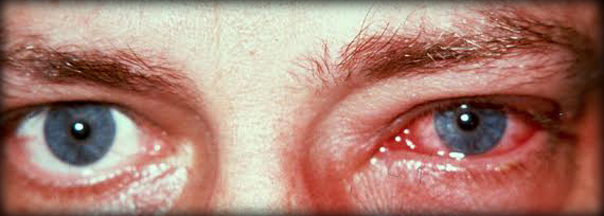Extremely
contagious!
Sri Lanka is on the cusp of a conjunctivitis breakout
but common sense and clean habits can keep the virus at bay:
by Carol Aloysius
 Sri Lanka appears to be heading towards an outbreak in
conjunctivitis, commonly known as ‘as lede’ in the local parlance, with
health officials warning the public to guard themselves against the
disease currently spreading all over the island. Sri Lanka appears to be heading towards an outbreak in
conjunctivitis, commonly known as ‘as lede’ in the local parlance, with
health officials warning the public to guard themselves against the
disease currently spreading all over the island.
The disease is by no means a stranger to hot tropical countries with
overcrowded populations and poor
sanitary conditions. In neighbouring countries such as India and
Bangladesh, the number of people suffering from conjunctivitis has
leaped beyond acceptable limits and even smaller countries such as Sri
Lanka and the Maldives are struggling to contain the disease, which is
now heading towards an outbreak, in spite of additional government
interventions.
Familiar as they are about the disease, many people still opt for
alternative methods of treating it with various home remedies. This, Dr
Asela Abeydeera,
 Community
Ophthalmologist and Co-ordinator of Vision 2020 of the Ministry of
Health warns, could be dangerous and cause more Community
Ophthalmologist and Co-ordinator of Vision 2020 of the Ministry of
Health warns, could be dangerous and cause more
complications than the disease itself.
Here Dr Asela Abeydeera explains how the disease is caused, and how
it could be prevented with a few simple easy to follow rules.
Excerpts...
Q: is it correct that we are now experiencing a surge in the
number of conjunctivitis cases in the country?
A: Yes. At present there is an outbreak of viral
conjunctivitis in most parts of the country.
Q: What is this disease? Is it something new?
A: it is a very common eye disease, which people call ‘ as
lede’ Almost everyone knows about it, although it is only now that many
people are actually coming to hospitals for treatment due to our
awareness raising efforts.
Q: How is it caused? Is it contagious?
A: It is caused by a virus – an adeno virus, which is very
contagious and spreads very easily and quickly from an infected person
to another.
Q: How?
A: Usually through direct close contact via tears and
discharge of the infected person and the droplets from the sneeze or
cough.
Q: Can it also spread in other ways?
A: Yes. If you were to share a towel belonging to an infected
person, or soap, or cosmetics such as lipstick, powder, or drink from
the same cup, you can easily get the disease. Other risk factors
include; sharing the same bed room or same bed with an infected person.
If the infected person were to cough or the tears flow into the nose and
mouth and get expelled into the air, a non infected person would bed at
great risk of contracting the disease.
Q: What are the symptoms of the disease? Can they be easily
identified?
A: Once you contract viral conjunctivitis, you will develop
redness in the eye. Usually both eyes will become red, although some
people manage to get away with just one red eye! There will be tearing
and discharge. Also, a feeling that there is some foreign body in the
eye like sand. In fact this has been one of the most frequent complaints
made by my patients when they visit our clinics.
|
How to protect oneself
from conjunctivitis
*Avoid going out to crowded
public places as far as possible especially at this time
when the disease is spreading
* Personal hygiene is very
important. So wash your hands thoroughly when you go out and
return home. If you have touched any surface which has been
contaminated by a person with sore eyes (conjunctivitis),
don’t touch your eyes afterwards without washing your hands
well with antiseptic soap.
*?Don’t touch your eyes when
you are travelling in a bus or train.
*It is easy to identify a
person with sore eyes. If you see such a person try not to
get sloe to him/her.
*If you have a patient in
the house , isolate that patient in a different room.
* Parents must stop sending
their children with sore eyes to school as the child should
rest and stay indoors and also not infect other children.
* Never use home remedies
for this condition or any other eye condition. Some use
breast milk ,kohomba kola or rose water .These are unproven
methods and could be dangerous . Also they could contain
harmful ingredients that could harm them more than the virus
itself.
*Remember that
conjunctivitis is self limiting- i.e. whether you treat it
or not it heals spontaneously within seven days usually.
There is no need to be alarmed by it or go into a panic.
Just seek medical advice no sooner you suspect you have the
symptoms and above all practice good personal hygiene at all
times. |
Q: is it true that patients also develop sensitivity to bright
lights?
A: Yes. We call this condition ‘ Photo-phobia where you
experience difficulty in facing bright lights.
Q: Any other symptoms?
A: They could also develop a pain in the eye and sometimes
mild fever with it.
Q:. Is it possible to have some warning signs of the onset of
the disease so you could take preventive action against it?
A: I’m afraid No. You see, even before the symptoms begin to
present,you could be already infected with the virus.
Q:. So does that mean you can also infect someone without even
knowing it?
A: Yes. Since you already have the virus, it could spread to
others with whom you come into close contact.
Q: What is the experience of patients who come to you with the
infection without knowing they have it?
A: Usually many of them say ‘ ahata vali giya ‘ ( sand went
into my eyes) but the real culprit is conjunctivitis .
Q: Who are those most at risk of getting the disease?
A: People who move a lot with other people in their day to day
lives while travelling in trains, buses or in crowded places. School
children can become infected if even one child with the disease were to
come to school that day.
Q: What about shanty dwellers?
A: shanty dwellers live in closed environments, with sometimes
10 people sharing the same room and even the same beds, these rooms are
usually ill ventilated and if anyone contracts the disease it will
quickly spread to the others.
Q: Does the lack of clean water pose a further risk?
A: Yes since it means they will not have enough clean water to
practise good personal hygiene.
Q: Any other risk groups?
A: Small children, pregnant women and old persons cannot
tolerate the disease as well as others. But this is true for any
infection, not just conjunctivitis,.
Q: Any complications from the disease? Can one get blind from
it?
A: Rarely. But you can get a rare co0mplication called
Keratitis – i.e.. white spots on the cornea or inflammation of the
cornea. For this however you require a different type of treatment.
Q: How would you know if you have this condition?
A: If after seven days of treatment you are still showing
symptoms such as blurred vision, irritation of the eye, photophobia,
headaches, then something is wrong. Seek advice from a good qualified
western medical doctor.
Q: What about those who have undergone surgery and develop the
disease shortly afterwards?
A: Yes this could be a problem especially in the case of
patients who have undergone cataract surgery just 2-3 days prior to
getting the disease. Then they could develop a very serious infection
which may require hospitalisation and intensive treatment.
Q: What is the usual treatment?
A: Actually there is no special treatment for this disease. I
goes away spontaneously whether you treat it or not. But we do
administer antibiotics to prevent secondary infection with bacteria.
What we use right now is a very basic antibiotic made by the State
Pharmaceutical Corporation and priced at below Rs 100. Any OPD will
issue this free to patients, with instructions to use only for one week.
Q: What happens if one overuses it?
A: Nothing. There are no reports of any adverse side effects,
but it is better to stop after seven days.
Q: In addition to administering antibiotics, do you also
recommend other interventions?
A: Conjunctivitis is a disabling disease. When you contract
it, it disables you temporarily as you are confined to the house and
unable to live a normal life.
Q: Does contracting conjunctivitis give you lifelong immunity
to the disease?
A: That is a myth. You can get conjunctivitis more than once.
But it could be a different type of the virus. |

